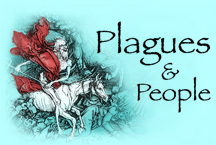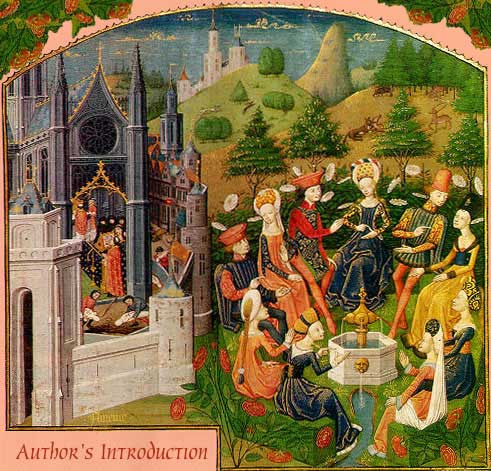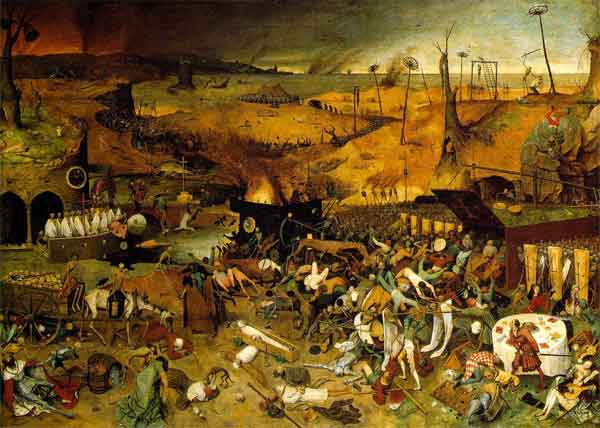Thirteen hundred and forty-eight years had already passed after the
fruitful Incarnation of the Son of God when into the distinguished city
of Florence, more noble than any other Italian city, there came the deadly
pestilence. It started in the East, either because of the influence
of heavenly bodies or because of God's just wrath as a punishment to mortals
for our wicked deeds, and it killed an infinite number of people.
Without pause it spread from one place and it stretched its miserable
length over the West. And against this pestilence no human wisdom
or foresight was of any avail; quantities of filth were removed from the
city by officials charged with this task; the entry of any sick person
into the city was prohibited; and many directives were issued concerning
the maintenance of good health. Nor were the humble supplications,
rendered not once but many times to God by pious people, through public
processions or by other means, efficacious; for almost at the beginning
of springtime of the year in question the plague began to show its sorrowful
effects in an extraordinary manner.
It did not act as it had done in the East, where bleeding from the nose
was a manifest sign of inevitable death, but it began in both men and women
with certain swellings either in the groin or under the armpits, some of
which grew to the size of a normal apple and others to the size of an egg
(more or less), and the people called them gavoccioli.
And from the two parts of the body already mentioned, within a brief
space of time, the said deadly gavoccioli began to spread indiscriminately
over every part of the body; and after this, the symptoms of the illness
changed to black or livid spots appearing on the arms and thighs, and on
every part of the body, some large ones and sometimes many little ones
scattered all around. And just as the gavoccioli were originally,
and still are, a very certain indication of impending death, in like manner
these spots came to mean the same thing for whoever had them.
Neither a doctor's advice nor the strength of medicine could do anything
to cure this illness; on the contrary, either the nature of the illness
was such that it afforded no cure, or else the doctors were so ignorant
that they did not recognize its cause and, as a result, could not prescribe
the proper remedy (in fact, the number of doctors, other than the well-trained,
was increased by a large number of men and women who had never had any
medical training); at any rate, few of the sick were ever cured, and almost
all died after the third day of the appearance of the previously described
symptoms (some sooner, others later), and most of them died without fever
or any other side effects.
This pestilence was so powerful that it was communicated to the healthy
by contact with the sick, the way a fire close to dry or oily things will
set them aflame. And the evil of the plague went even further:
not only did talking to or being around the sick bring infection and a
common death, but also touching the clothes of the sick or anything touched
or used by them seemed to communicate this very disease to the person involved.
What I am about to say is incredible to hear, and if I and others had
not witnessed it with our own eyes, I should not dare believe it (let alone
write about it), no matter how trustworthy a person I might have heard
it from. Let me say, then, that the power of the plague described
here was of such virulence in spreading from one person to another that
not only did it pass from one man to the next, but, what's more, it was
often transmitted from the garments of a sick or dead man to animals that
not only became contaminated by the disease, but also died within a brief
period of time. My own eyes, as I said earlier, witnessed such a
thing one day: when the rags of a poor man who died of this disease
were thrown into the public street, two pigs came upon them, as they are
wont to do, and first with their snouts and then with their teeth they
took the rags and shook them around; and within a short time, after a number
of convulsions, both pigs fell dead upon the ill-fated rags, as if they
had been poisoned.
From these and many similar or worse occurrences there came about such
fear and such fantastic notions among those who remained alive that almost
all of them took a very cruel attitude in the matter; that is, they completely
avoided the sick and their possessions; and in so doing, each one believed
that he was protecting his good health.
There were some people who thought that living moderately and avoiding
all superfluity might help a great deal in resisting this disease, and
so, they gathered in small groups and lived entirely apart from everyone
else. They shut themselves up in those houses where there were no
sick people and where one could live well by eating the most delicate of
foods and drinking the finest of wines (doing so always in moderation),
allowing no one to speak about or listen to anything said about the sick
and the dead outside; these people lived, spending their time with music
and other pleasures that they could arrange.
Others thought the opposite: they believed that drinking too much,
enjoying life, going about singing and celebrating, satisfying in every
way the appetites as best one could, laughing, and making light of everything
that happened was the best medicine for such a disease; so they practiced
to the fullest what they believed by going from one tavern to another all
day and night, drinking to excess; and often they would make merry in private
homes, doing everything that pleased or amused them the most. This
they were able to do easily, for everyone felt he was doomed to die and,
as a result, abandoned his property, so that most of the houses had become
common property, and any stranger who came upon them used them as if he
were their rightful owner.
In addition to this bestial behavior, they always managed to avoid the
sick as best they could. And in this great affliction and misery
of our city the revered authority of the laws, both divine and human, had
fallen and almost completely disappeared, for, like other men, the ministers
and executors of the laws were either dead or sick or so short of help
that it was impossible for them to fulfill their duties; as a result, everybody
was free to do as he pleased.
Many others adopted a middle course between the two attitudes just described:
neither did they restrict their food or drink so much as the first group
nor did they fall into such dissoluteness and drunkenness as the second;
rather, they satisfied their appetites to a moderate degree. They
did not shut themselves up, but went around carrying in their hands flowers,
or sweet-smelling herbs, or various kinds of spices; and often they would
put these things to their noses, believing that such smells were a wonderful
means of purifying the brain, for all the air seemed infected with the
stench of dead bodies, sickness, and medicines.
Others were of a crueler opinion (though it was, perhaps, a safer one):
they maintained that there was no better medicine against the plague than
to flee from it; and convinced of this reasoning, not caring about anything
but themselves, men and women in great numbers abandoned their city, their
houses, their farms, their relatives, and their possessions and sought
other places, and they went at least as far away as the Florentine countryside--as
if the wrath of God could not pursue them with this pestilence wherever
they went but would only strike those it found within the walls of the
city! Or perhaps they thought that Florence's last hour had come
and that no one in the city would remain alive.
And not all those who adopted these diverse opinions died, nor did they
all escape with their lives; on the contrary, many of those who thought
this way were falling sick everywhere, and since they had given, when they
were healthy, the bad example of avoiding the sick, they, in turn, were
abandoned and left to languish away without care.
The fact was that one citizen avoided another, that almost no one cared
for his neighbor, and that relatives rarely or hardly ever visited each
other--they stayed far apart. This disaster had struck such fear into
the hearts of men and women that brother abandoned brother, uncle abandoned
nephew, sister left brother, and very often wife abandoned husband, and -- even
worse, almost unbelievable -- fathers and mothers neglected to tend and care
for their children, as if they were not their own.
Thus, for the countless multitude of men and women who fell sick, there
remained no support except the charity of their friends (and these were
few) or the avarice of servants, who worked for inflated salaries and indecent
periods of time and who, in spite of this, were few and far between; and
those few were men or women of little wit (most of them not trained for
such service) who did little else but hand different things to the sick
when requested to do so or watch over them while they died, and in this
service, they very often lost their own lives and their profits.
And since the sick were abandoned by their neighbors, their parents,
and their friends and there was a scarcity of servants, a practice that
was almost unheard of before spread through the city: when a woman
fell sick, no matter how attractive or beautiful or noble she might be,
she did not mind having a manservant (whoever he might be, no matter how
young or old he was), and she had no shame whatsoever in revealing any
part of her body to him--the way she would have done to a woman -- when the
necessity of her sickness required her to do so. This practice was,
perhaps, in the days that followed the pestilence, the cause of looser
morals in the women who survived the plague.
And so, many people died who, by chance, might have survived if they
had been attended to. Between the lack of competent attendants, which
the sick were unable to obtain, and the violence of the pestilence, there
were so many, many people who died in the city both day and night that
it was incredible just to hear this described, not to mention seeing it!
Therefore, out of sheer necessity, there arose among those who remained
alive customs which were contrary to the established practices of the time.
It was the custom, as it is again today, for the women, relatives, and
neighbors to gather together in the house of a dead person and there to
mourn with the women who had been dearest to him; on the other hand, in
front of the deceased's home, his male relatives would gather together
with his male neighbors and other citizens, and the clergy also came (many
of them, or sometimes just a few) depending upon the social class of the
dead man. Then, upon the shoulders of his equals, he was carried
to
the church chosen by him before death with the funeral pomp of candles
and chants.
With the fury of the pestilence increasing, this custom, for the most
part, died out and other practices took its place. And so, not only
did people die without having a number of women around them, but there
were many who passed away without even having a single witness present,
and very few were granted the piteous laments and bitter tears of their
relatives; on the contrary, most relatives were somewhere else, laughing,
joking, and amusing themselves; even the women learned this practice too
well, having put aside, for the most part, their womanly compassion for
their own safety.
Very few were the dead whose bodies were accompanied to the church by
more than ten or twelve of their neighbors, and these dead bodies were
not even carried on the shoulders of honored and reputable citizens but
rather by gravediggers from the lower classes that were called becchini.
Working for pay, they would pick up the bier and hurry it off, not to the
church the dead man had chosen before his death but, in most cases, to
the church closest by, accompanied by four or six churchmen with just a
few candles, and often none at all. With the help of these becchini,
the churchmen would place the body as fast as they could in whatever unoccupied
grave they could find, without going to the trouble of saying long or solemn
burial services.
The plight of the lower class and, perhaps, a large part of the middle
class, was even more pathetic: most of them stayed in their homes
or neighborhoods either because of their poverty or their hopes for remaining
safe, and every day they fell sick by the thousands; and not having servants
or attendants of any kind, they almost always died. Many ended their
lives in the public streets, during the day or at night, while many others
who died in their homes were discovered dead by their neighbors only by
the smell of their decomposing bodies. |



